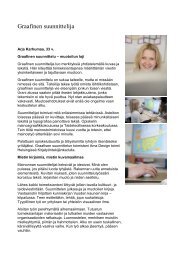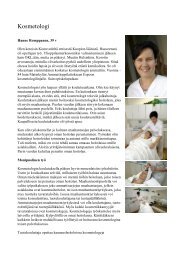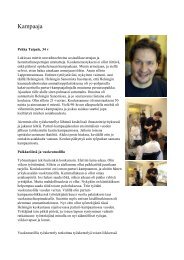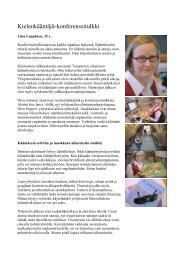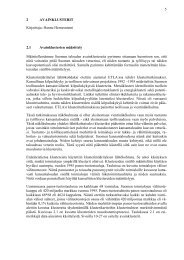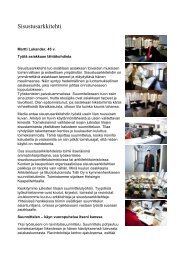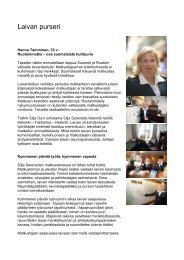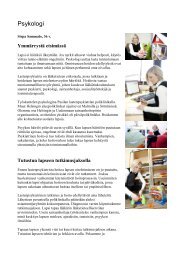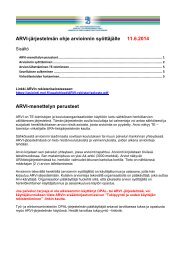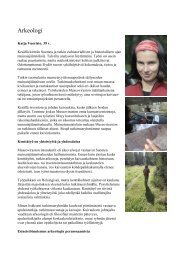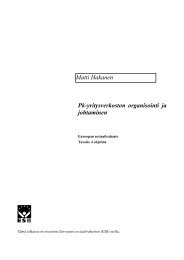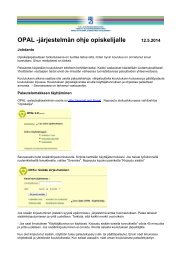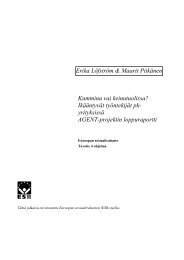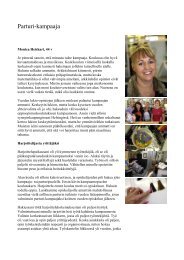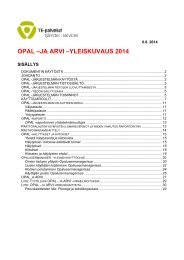Working Life Barometer in the Baltic Countries 2002 (pdf) - mol.fi
Working Life Barometer in the Baltic Countries 2002 (pdf) - mol.fi
Working Life Barometer in the Baltic Countries 2002 (pdf) - mol.fi
Create successful ePaper yourself
Turn your PDF publications into a flip-book with our unique Google optimized e-Paper software.
197<br />
MODERN SOCIETY – INFORMATION SOCIETY<br />
<strong>Work<strong>in</strong>g</strong> at home is often l<strong>in</strong>ked to <strong>the</strong> utilisation of modern of<strong>fi</strong>ce technology,<br />
computers and mobile phones. These tools enable <strong>the</strong> work to be done<br />
elsewhere than at <strong>the</strong> workplace. Information and computer technologies have<br />
led to profound changes <strong>in</strong> <strong>the</strong> organisation of work at micro level as well as<br />
<strong>in</strong> labour markets at macro level over <strong>the</strong> last decades. The ability of <strong>in</strong>dividuals,<br />
companies and government to adapt to <strong>the</strong>se changes appears to largely<br />
determ<strong>in</strong>e <strong>the</strong>ir success <strong>in</strong> <strong>the</strong> <strong>in</strong>formation society. This is be<strong>in</strong>g reflected by<br />
EU policy mak<strong>in</strong>g such as <strong>the</strong> eEurope <strong>in</strong>itiative and <strong>the</strong> European Employment<br />
Strategy, and has led to <strong>in</strong>creas<strong>in</strong>g demand for timely data on <strong>in</strong>formation<br />
society related issues such as ICT-enabled new ways of work<strong>in</strong>g, telework,<br />
work-related IT skills, employment <strong>in</strong> IT sectors and occupations, and<br />
many more. (SIBIS <strong>2002</strong>, 5).<br />
This transition <strong>in</strong> progress world-wide is characterised by <strong>the</strong> <strong>in</strong>formation<br />
technology ‘revolution’ and - by way of this - <strong>the</strong> spread of a new economy,<br />
globalisation, and <strong>the</strong> rise of <strong>the</strong> so-called network society. (See e.g. Castells<br />
1996). The boundaries of nation-states may rema<strong>in</strong> as <strong>the</strong>y are for <strong>the</strong> most<br />
part, but <strong>the</strong>ir ability to conf<strong>in</strong>e with<strong>in</strong> <strong>the</strong>m - or prevent <strong>the</strong> access of - various<br />
ideas, cultural <strong>in</strong>fluences, <strong>in</strong>ternational competition, movements of capital etc.,<br />
has become substantially weakened. (Beck 1999). The present day signi<strong>fi</strong>es <strong>in</strong><br />
many senses a ’death of distance’, an open<strong>in</strong>g up of borders, and an ever<br />
greater mutual separation of <strong>the</strong> concepts of time and place (see e.g. Bauman<br />
<strong>2002</strong>, Giddens & Pierson 1998). These aspects have a strong impact on work<strong>in</strong>g<br />
life, too. The transnationalisation of companies, <strong>the</strong> alteration of <strong>the</strong>ir<br />
strategies to cover <strong>the</strong> world as widely as possible, and <strong>the</strong> change <strong>in</strong> <strong>the</strong>ir organisations<br />
to be more network-oriented, mean a ra<strong>the</strong>r different operat<strong>in</strong>g<br />
environment - to which people have become accustomed <strong>in</strong> recent decades <strong>in</strong><br />
<strong>the</strong> <strong>Baltic</strong> countries as elsewhere. It was not until <strong>the</strong> advent of modern <strong>in</strong>formation<br />
technology, headed by <strong>the</strong> Internet and mobile phone technology, that<br />
<strong>the</strong> change became possible. The ’death of distance’ mentioned above means<br />
that back-and-forth communication between actors can take place at <strong>the</strong> same<br />
time, <strong>in</strong>dependently of <strong>the</strong>ir physical distance from one ano<strong>the</strong>r.<br />
This societal upheaval is not treat<strong>in</strong>g all citizens <strong>in</strong> <strong>the</strong> same way. Some are<br />
better placed than o<strong>the</strong>rs <strong>in</strong> <strong>the</strong> ever-grow<strong>in</strong>g transition to a life that is organ-



